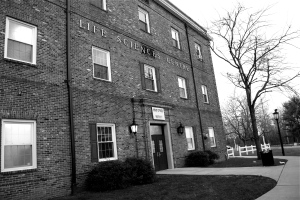As the winter season sets upon the C.W. Post Campus, students can look forward to scenic snowfalls, chilly weather, and, unfortunately, cold and flu season. With the potential for germs to spread rapidly throughout residence halls and classrooms, it is imperative that sick students seek medical attention. The health professionals at the Student Health and Counseling Center, otherwise known as the Infirmary, can assist students with their medical and psychological needs.
“If we can handle what students have with the resources we have here, we do,” stated Sylvia Barton, R.N., the Associate Director of Medical Services at the Student Health and Counseling Center. “If not, we have three local hospitals nearby that we can send you to.”
Housed in the basement of Life Sciences/Pell Hall in Room 154, the Student Health and Counseling Center is open Mondays through Fridays from 8 a.m. to 8 p.m. during the fall and spring semesters and from 9 a.m. to 5 p.m. in the winter and summer sessions. It is staffed by primary care physicians, a gynecologist, a psychiatrist, counselors and nurses, all of whom are bona fide, experienced medical professionals.
Primary care doctors at the Student Health and Counseling Center examine both ill and injured students, diagnose their conditions and treat them with medications if they are able to. If students require more thorough examinations, the doctors on campus refer them to local specialists who can better care for them
“We have limited medications here. We are a dispensary, not a pharmacy, so we dispense the medications that our doctors require,” stated Barton. “We don’t fill prescriptions if you bring them to us from other doctors; we aren’t a pharmacy. But, most medicines we have here cost less than the co-pay you’d pay at a pharmacy.”
In addition to the primary care physicians, the gynecological staff assists female patients with routine exams and provides birth control prescriptions and condoms if needed. For students who do not have insurance or do not wish to use their insurance for certain tests, such as pregnancy blood tests or throat cultures, Barton says that students may pay cash for the tests, and nothing regarding the tests will be sent to their homes. “Everything is confidential here,” she said. However, these tests must be paid for upfront, and they must be paid for via cash or check, as the Infirmary is not equipped with a credit card or debit card swipe machine.
As for students who are suffering from academic or personal stress, relationship troubles, depression, anxiety, low self-confidence, nutritional dilemmas, or are suffering in the wake of a rape or an assault, among other troubles, counseling services are available to offer assistance to students to help them work through these hardships.
According to Barton, the most common reasons students find themselves in the Infirmary are because “they think they have colds, and in the winter, many of them get rhinitis [an inflammation of the mucous membrane in the nose] because of the dry, winter weather. We also see stomach viruses, especially last winter when it was going through the dorms.” She continued, “We’ve also seen more complicated conditions, like asthma and things of that nature.”
While the services at the Student Health and Counseling Center are extensive, many students on campus have little knowledge of the Center’s existence, particularly commuter students who rush to and from campus throughout the day.
“I didn’t even know we had an infirmary, and I don’t know where it is,” said Filomena Pascarella, a senior Elementary Education major.
Other students are aware that C.W. Post has an infirmary, but they have rarely, if ever, utilized its services. “I know that the school has an infirmary, but if I were sick, I would go to my regular doctor because that is more convenient for me,” said Nicole Mylonas, a senior Marketing major.
A junior English major in Professor Ryden’s Creative Nonfiction class, who wished to remain anonymous, added, “I went there like once for condoms. They’re cheaper there.”
Despite this, however, Barton insists that many students walk through the Student Health and Counseling Center’s doors each semester. “It used to be chaotic,” she said. “That’s why students need to make appointments to see the doctors now. But, you don’t need an appointment to see a nurse.”
While it would seem that the Student Health and Counseling Center does its best to aid students, junior Allyson Reynolds, a Childhood Education major, begs to differ. “The Infirmary is not good at all,” she said. “I went there my freshman year because of a pain in my stomach and a cough. They told me it was a sore throat and that my stomach hurt from coughing. I went home later in the week to my doctor to find out that I had a stomach ulcer and mono. I will never go back to the Infirmary.”
For students who are under the weather and can’t get home to their own doctors or counselors, however, the Student Health and Counseling Center may be a good alternative, especially during finals week.
“If you’re having test anxiety, especially now, during finals, you should come see a counselor. There’s no reason to be so stressed that you’re pulling your hair out,” said Nurse Barton. She also reminds students that flu vaccinations are available for $10 in the Infirmary and that it’s not too late to get them.
For more information about the Student Health and Counseling Center, you may visit the office in Room 154 of Life Sciences/Pell Hall, or you may visit the website at
http://www.liu.edu/CWPost/StudentLife/Services/SHCC.aspx.




Be First to Comment